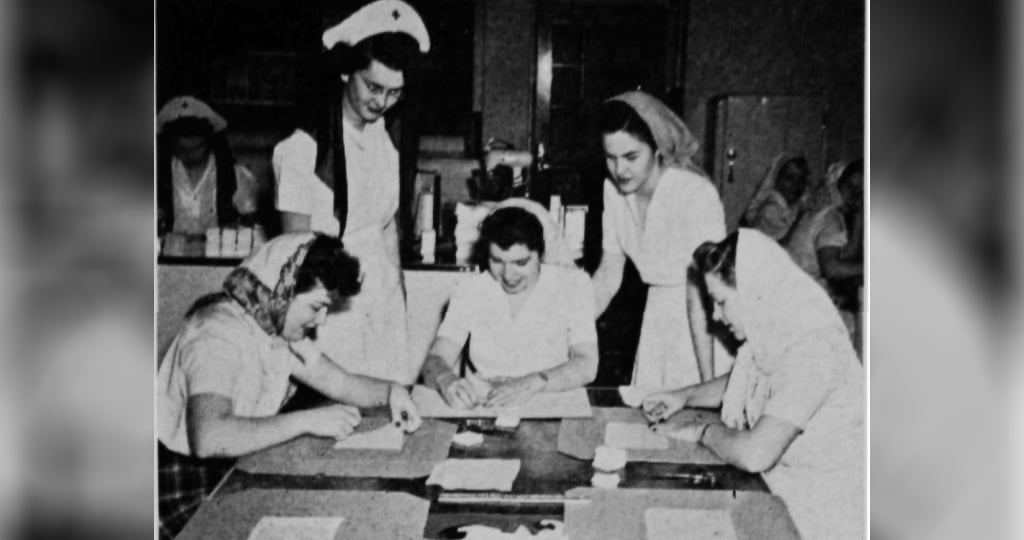
Veteran Bandage-rollers pictured at the campus Red Cross headquarters are, left to right, Betty Lawrence, Anne Graham, Leslie Brockelbank, Carol Wicke, and June Grantz. Women's living organizations stage a contest each week to determine which house puts in the most hours at Red Cross.
Coeds Learn War Jobs at Oregon
Women at the University are becoming increasingly conscious that they, too, must help win the war. Red lettered signs recently fluttered from campus trees to stress the need of workers at the campus Red Cross headquarters. Vocations the country over now open doors wide to college-trained women, whereas coeds formerly met disapproval from some male-minded employers. Mary Ann Campbell, ’43, here summarizes opportunities so that alumni can use the material to advise potential University students.
Not even the most carping and faultfinding critic can accuse University of Oregon coeds with frivolity this year. Since a course of studies was carefully mapped out by Karl W. Onthank, dean of personnel administration, in cooperation with Heads of Women's Houses on the campus, the little pamphlet titled "War Work for University of Oregon Women" has been consulted before registration by nearly every girl at the University.
The fields are varied and the opportunities for jobs are tabulated, besides the recommended fields of study. If a girl can do drafting, for instance, she will be regarded as pretty special by the men who do the hiring at airplane and ship construction plants, or in connection with emergency housing and army camps. Chemistry, also, has always been considered as a field of major importance, and is now more than ever vital to the war effort. The girl who knows her test-tubes and formulas will not have to seek far after graduation before she is snatched up by one of the big chemical companies, or in the laboratories where technicians have been vanishing towards the armed forces.
The shortage of teachers is another of the manpower headaches, and teaching is one place where women have always predominated. Now the men who used to have the math and science classes have disappeared, so there is a greater opportunity than ever for a woman whose interest concerns secondary and primary education. The girl who is qualified to teach mathematics is doing a great deal towards the war effort, for there is almost as great a shortage of qualified teachers as there is of students who know the fundamentals of this particular branch of science.
Many of the suggested courses overlap, especially those which are concerned either directly or indirectly with math, physics, photography, map-making, astronomy, and medicine.
Another chance for the physicist is found in the present search for radio technicians, weather observers, and meteorologists.
The student who plans to enter nursing makes no greater contribution to her country, since the tremendous drain of nurses from civilian life to the army has placed a great responsibility on those who stay on the home front.
The language major has her chance too, for the linguistic complications of this war have been considerable. Apart from opportunities of working with the state department in South American countries, there is a place for teachers of languages, especially the little-known ones, such as Portuguese, Afrikaans, Arabic dialects, and, of course, Russian and Japanese. So few Americans can speak, write, or even read, these languages that the government has been forced to establish special schools where carefully chosen men are sent to learn the language of our enemies. The student of languages will find openings in offices in our foreign service as secretary or clerk, in decoding and cryptography, and in propaganda departments, where the knowledge of using languages effectively is essential.
Government agencies have sent out a call for librarians, for the girl who works in a finger-printing office is regarded as a librarian as much as the one who catalogues bibliographies. The newest position in the librarian's field is that of army camp librarian, so any enterprising young woman who qualifies under the government's requirements can apply for this type of work.
The secretary never has trouble finding a place for herself and her specialized training, which is in constant demand in every office. There is a more impressive amount of paperwork than ever to be done, since the new government agencies which were created especially for the war have begun to function. The tools of typing and shorthand are necessary, but even a fair stenographer can find a job. The University has enlarged its sections in these classes, with an eye to supplementing the work offered in other departments by turning out women who will be competent to fill the secretarial vacancies left in every business and government agency at present.
The psychologist and sociologist discovers, as she studies the different aspects of her field, that the problems of humanity never vary fundamentally, and are never satisfactorily solved.
As juvenile delinquency problems grow in even the smaller communities where new war industries do not aggravate the situation, and as the changes in homes add to the burdens of men and women already over-loaded with responsibility, the social service worker sees more than ever the necessity of her work. Through different organizations she can help direct the welfare of the community and thus contribute to the end of the evils of poverty, disease, crime, and misery that have haunted mankind since the beginning of historical record. Then the girl who is prepared in such fields can contribute directly to the war effort and at the same time prepare to build the peace.
The girls of the University realize that they are very privileged to be allowed to continue their education, while their brothers leave to fight, so they are carrying out the traditions of education and at the same time preparing themselves definitely to assist the men both while the war is still being fought and after the peace is signed.
- By Mary Ann Campbell, ’43, Old Oregon May 1943

